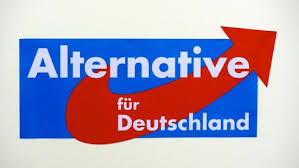Protest parties come and go in Germany. The newest one to appear on the scene - Alternative für Deutschland – may have legs:
Germany’s newest protest party has a dramatic,
crisis-era sales pitch to German voters. The euro was a “fatal mistake
that threatens all our prosperity”, it says in its manifesto, thus a
return to national European currencies and an “orderly dissolution” of
the single currency is necessary.Otherwise the party demands a change of EU
treaties to allow Germany’s exit from the euro – vetoing further loans
from the European Stability Mechanism bailout fund as leverage if need
be. “We present an alternative to the so-called ‘no-alternative’
politics,” proclaims its manifesto.
It is a message that resonates with many Germans across the political spectrum. Some have accused AfD of being a decoy for right-wing extremist elements, especially since it has been favorably discussed by the neo-fascist weekly Junge Freiheit. But a look at the party's official platform on it Web site doesn't necessarily support that view. It is all about leaving the Euro behind; the party's social agenda is perfunctory and pretty much mirrors that of the CDU.
In an interview for Der Spiegel, one of AfD's founders – Konrad Adam – claims that the party tries to weed out Nazis and other extremisits:
Adam: Wir fragen bei der Aufnahme neuer Mitglieder nach früheren
Parteizugehörigkeiten. Wer bei der NPD oder der DVU war, ist bei uns
nicht willkommen. Wir haben schon Beitrittskandidaten abgelehnt und
Mitglieder wieder ausgeschlossen. Das werden wir auch weiterhin tun.
According to Die Zeit, the upstart AfD is being taken very seriously in Berlin, precisely because it is not a party of fanatics. And it could conceively cost Angela Merkel the election:
Trotzdem ist die Alternative für Deutschland die erste Protestpartei,
die man in Berlin ernst nimmt. Offiziell wird sie von Union und FDP
ignoriert. Aber im kleinen Kreis geben bürgerliche Politiker zu, dass
sie die neue Partei fürchten. "Das ist Fleisch von unserem Fleische",
sagen sie. Die Parteimitglieder seien keine Spinner oder Sektierer,
sondern Menschen mit bürgerlichen Berufen. Und wenn die Euro-Skeptiker
bei der Wahl nur ein bis zwei Prozent der Stimmen holten – dann könnten
das genau jene Prozentpunkte sein, die Merkel am Ende fehlten.(Even so, the Alternative for Germany is the first protest party that Berlin takes seriously. Officially it is ignored by the CDU and the Liberals (FDP). But inofficially the politicians admit that they are a bit afraid. "These are people of our own flesh and blood," they say. The Party members are not cultists or fanatics, but rather mainstream professionals. And if the Euro-skeptics win just one or two percent of the votes in the next election – even that small margin could mean the end for Merkel.)



1 comment
Their success is highly unpredictable at this moment.
Most important factors for it would be:
– How negative/positive the media report on it in the coming months
– whether the seemingly intellectual touch of its first members (PhDs and Professors and so forth) can actually connect to the broad masses.
– whether further unpopular measurements have to be enacted by the current government until the election.
Even if they do not play a major role in the future, I expect them to have a similar impact on the political landscape as the Green Party had: Before the Greens, the established parties could afford to neglect environmental policies. After their ascend, the others had to occupy this part of politics – and if only to appease the public and draw voters away from them.
So if nothing goes terribly wrong, the AfD’s biggest impact could be a more euro-sceptic political landscape in Germany (for better or worse).